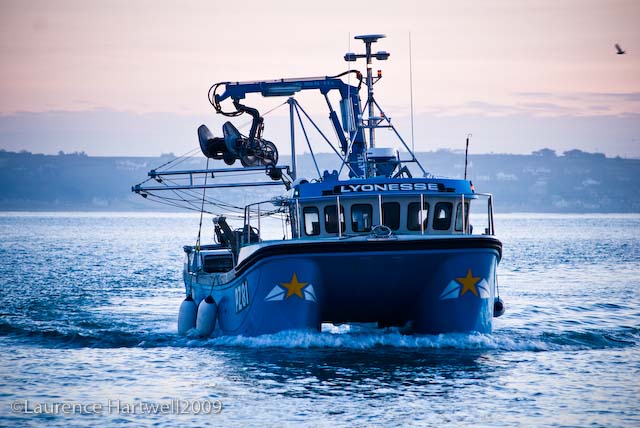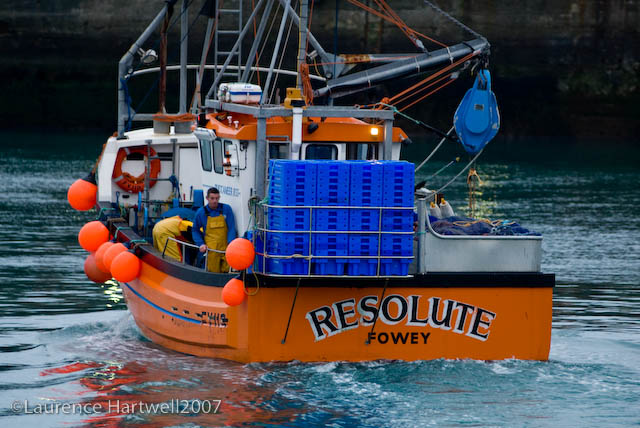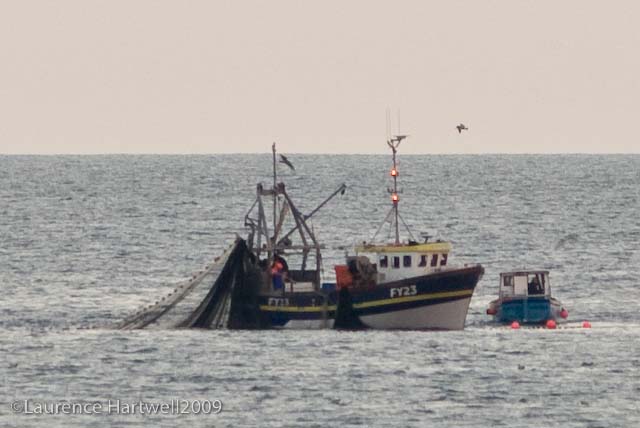Federation Offers Greenpeace A Way To Start Delivering 'Real and Tangible' Support to Small Boat Fisherman
The National Federation of Fisherman's Organisations (NFFO), the body representing fishermen's groups, individual fishermen and producer organisations in England, Wales and Northern Ireland is offering to broker a meeting with Greenpeace to identify more 'real and tangible ways' the environmental campaigning body can contribute to the sustainable and commercial goals of the UK fishing industry.
The offer comes after the NFFO described a recent report by the environmental giant as containing 'flawed research' which risked dividing and damaging the very livelihoods, industry and food supply the environmental group purports to support.
The Federation has said it is strongly urging Greenpeace to consider its ongoing course of action which is divisive and destructive to an industry where both small and large boat fishermen work closely together to achieve a sustainable future and food source.
According to the NFFO, Greenpeace's 'Wolf in Shrimp's Clothing' report contains claims which misrepresent and discredit the many independent, inshore, small boat fishermen who take an active role lobbying for better livelihoods as part of the NFFO.
Ned Clark, inshore fisherman and Chair of the North East Committee of the National Federation of Fishermen's Organisations (NFFO) said: "Greenpeace campaigns for a living – we are campaigning to make a living. It is mildly amusing that in its press releases, Greenpeace refers to the NFFO as a 'Fishing Giant'. This is flattering but hardly an accurate description of an organisation with two frontline staff.
"If the NFFO is influential, it is because it is energetic and advances credible policies but mainly because it is supported by the voluntary work of dozens of real fishermen – not campaigners - including many owning small boat vessels. So which organisation can truly claim to represent and be represented by real fishermen?
"We have already publically addressed many of the inaccuracies contained in Greenpeace's report, but they still seem set on continuing a public spat which holds no benefit to fisherman they purport to support. As such we would like to meet with them not only to be transparent in how we work, but to offer the opportunity for Greenpeace to be involved in the range of real initiatives we have underway that are focused on improving both the sustainability and livelihoods of the small boat fisherman."
Mr Clark added: "Much of Greenpeace's activity has been set on painting the NFFO as a body whose influence is dominated by the interests of large over-seas trawlers. We have already demonstrated publically this isn't the case. Each NFFO producer organisation and regional committee nominates two representatives each to sit on our Executive Committee, irrespective of how much subscription it pays. Policy decisions are the result of consensus, taking into account all the views around the table. This is how we ensure the interests of the entire UK fleet are at the heart of our decision making.
"There are data protection issues we have to address in terms of publishing full membership data on our website but are contacting our members about doing so."
The core of the Greenpeace claims centre around the assertion the NFFO does nothing to support the inshore fleets. The Federation says much of its work throughout the year is of direct benefit to the whole of the fishing industry, including the small-scale fleet. This includes working with scientists to address data deficiencies and raise TACs, working on fishing vessel safety and addressing the impact of marine protected areas.
There have also been a host of specific initiatives in which the NFFO has championed the interest of the small boat fisherman. In the last few months alone it has:
- Opposed a TAC for bass through discussions with DEFRA and through the regional advisory councils; this is of direct and overwhelming importance to many small-scale fishermen
- Proposed and worked with government on a range of positive ideas for addressing quota pinch points for the under-10s; the NFFO alone has put forward credible and balanced alternatives
- Strenuously resisted the reallocation of handline mackerel quota to the large pelagic vessels; and brokered an understanding with the Scottish Fishermen's Pelagic Association; this protects the hand-line fishery but equally important safeguards swap currency to be used for the benefit of the under-10m fleet
- Successfully opposed the extension of days at sea restrictions to the under-10m fleet
- Vigorously defended the small-scale fishery for salmon in the North East of England Highlighted the failure of fisheries management in the Thames estuary;
- Advanced policy ideas to address the latent capacity threat in the crab and lobster fisheries, whilst safeguarding necessary flexibilities for the small scale fleets
- Worked within the MPA Fishing Coalition to defend important inshore fishing grounds from disappearing into No Take Zones as part of European Marine Sites and UK marine conservation zones
- Defended small-scale fisheries from the displacement effects of offshore wind-farms and marine protected areas
- Pressed DEFRA for equity of treatment between under-10m, over-10m vessels in producer organisations and non-PO (Non-sector)vessels in the facility to lease quota
- Fought for an exemption from EU electronic logbook and VMS requirements for day boats which fish entirely within UK waters
- Sought to broker a deal that would end the Judicial Review brought by UKAFPO against DEFRA's quota redistribution proposals
- Advanced ideas for increased flow of quota to the small scale fleets though closer cooperation and communication between producer organisations and the small scale fleets
- Proposed fisheries science projects of benefit to small scale fisheries including one on undulate ray
- Ensured that the small scale fleets had a representative as part of the NFFO team at the December Council








